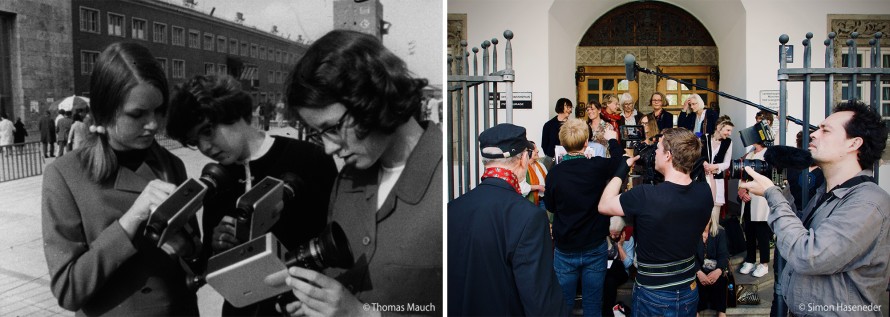2024 | Artistic Director's Blog
Edgar Reitz, Heimat, Cinema

Scenes from Heimat
Carlo Chatrian was Artistic Director of the Berlinale from June 2019 to March 2024. In his texts, he takes a personal approach to the festival, to outstanding filmmakers and the programme.
Edgar Reitz is the author of a unique, unmatchable piece of work whose impact still reverbs today in a clear manner and has yet to be fully evaluated. With its different seasons and visionary planning for its time, Heimat is up there with the most important television series of the 21st century. While the scope of the overall vision remains the most striking element, Reitz also hits the mark in terms of individual storytelling: the mise-en-scène, the use of camera movements, silence and dialogue, black-and-white and colour, all sink their roots into the tradition of modern cinema. From that unique moment in film history, a moment of exploration and freedom of expression that led to a proper revolution in cinematic language, Reitz extrapolated the underlying dialectic, the exchange between basic realism dictated by the moving image and the capacity for abstraction that is part of oral storytelling. Therefore, almost naturally, those who have “lived through” Heimat (in one or more of its various “seasons”) come to perceive Reitz’s fictional village and the adventures of the family Simon as a metaphor for cinema’s power to create places and characters capable of becoming more real than the reality we deal with on a daily basis.
Cinema freezes certain moments forever, and at the same time it prolongs their life, letting them resonate with the viewer’s ever changing life experience.

Then and now: Filmstunde_23
Filmstunde_23 stems from the desire, or opportunity, to encounter the protagonists of a documentary filmed more than 50 years prior. With the freedom of artists who no longer need to prove themselves, Reitz appears unconcerned with giving his film a predetermined, rigid form. What prevails is the idea of the encounter: the dialogue between the protagonists in the present and the images of their teenage selves blends with another dialogue, between the digital film of today and the analogue one of years past. On the surface, Filmstunde 23 is a simple film, one we’d call didactic. In reality, it conceals a precise meditation on societal evolution, the means to depict it, the power of cinema, and how we master those tools. At the age of 91, Reitz has the skill and wisdom to avoid reducing the footage he shot in 1968 to a mere nostalgic object; instead, he turns them into a prism through which to read the present. The older film becomes a mirror, reflecting our aged image, now less innocent but also more aware of the delusions of youth. Paradoxically, the celluloid matter and grain take on a dreamlike quality, while the colourful patterns of the digital become real.

Edgar Reitz in Filmstunde_23
As is often the case with Reitz, the film is also a kind of self-portrait, not so much of the man as it is of the filmmaker. Reading between the lines, one notices the throughline of his cinematic vision: the presence of women as the real thrust of the story; the almost natural impulse to depict a community instead of focusing on a single character; the drive to take the camera outside, skilfully alternating between objects (filmed in close-up) and nature; the almost visceral relationship between work and play, duty and pleasure. Being about a film class, Filmstunde_23 also becomes a way of pondering how filmmaking was back then and what it has become today. The screening room, the set, the camera, the boom pole enter the frame and become elements that can define the storytelling space. Revisited years later, that class populated by the filmmaking machine isn’t that different from the village of Schabbach. It is a real place and an imagined one, incredibly close and accessible, and yet always one step ahead (or behind) vis-à-vis our position, always ours and forever lost.
The final scene has a particular flavour. Edgar Reitz exits the “class” and, with his wife in his arm, walks into the distance with a light step, down the street – not in the middle of it, but diligently on the sidewalk. The idea of closing out what may be his last film with a reference to a famous Chaplin ending reminds us that "Heimat" is cinema itself. A place that inhabits us, rather than the other way around.
Carlo Chatrian